The city of Jaisalmer is only a four-hour bus ride from Jodhpur (220 rupees), so we jumped on the 7:00 AM bus and landed in the arid Thar Desert town at 11:00 AM.
Like Lonely Planet promised, our bus was so mobbed with touts when we arrived that we could hardly push our way off. Lucky me, one guy with a crazy beard was holding a business card with “MATT WICKS” written on it, as big as the space would allow. He parted the touts like the red sea and led us away.
“Sir, from what country are you?” said one tout (like they all do), attempting to engage/sell.
“He’s from INDIA” interjected our hero, smiling wide.
We grabbed our packs from the hold of the bus and jumped in his jeep.
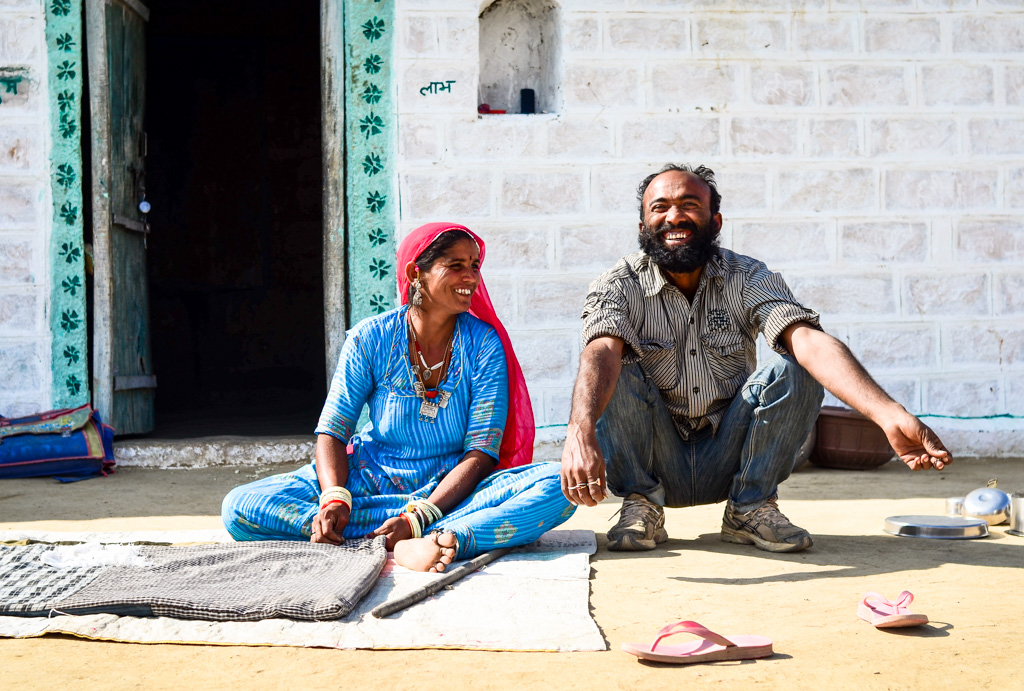
He saved us from the Jaisalmer bus touts! My hero. Great beard too.
This meeting was pre-arranged, of course. One of the things to do in Jaisalmer is to go on a “camel safari”, a camel ride for a half-day to multiple nights. We chose an overnight safari leaving at 1:30 PM with an overnight stay under the stars in the desert, returning at 11:00 AM the next day. The cost, with food, water, blankets and camel was 850 rupees per day, or 1700 per person for the whole shebang. We booked via e-mail with the Lonely Planet-recommended camel safari company Trotters, and had a good experience.
Riding camels, elephants, et al is not really a priority for me. Most of the time, the animals aren’t treated particularly well, and I’m not always thrilled to help make animals unwitting/unwilling participants in a commercial machine. Were our camels well treated? Hard to say, because I have no idea what a happy camel looks like. I was riding camels more for the camping than the riding.
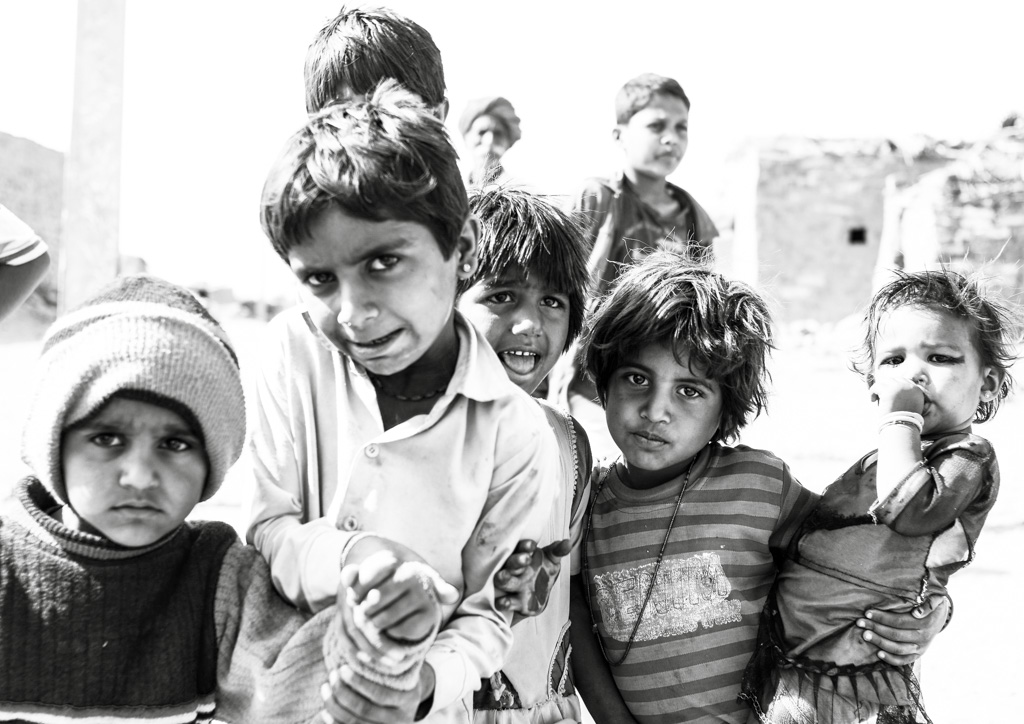
curious village kids near Jaisalmer.
We embarked for the camel safari at 1:30 PM in a jeep with two locals, two Dutch gentlemen, two Spanish, a Belgian and another American. We were unaware that this jeep ride would involve a few stops at local villages poor enough to still use cow dung as fuel. The children at the villages were friendly and wanted to get in photos (and sometimes wanted money for them, of course). Our guide told us not to pay them – I think the villages were getting a small cut of our camel safari fees, so no problem there.
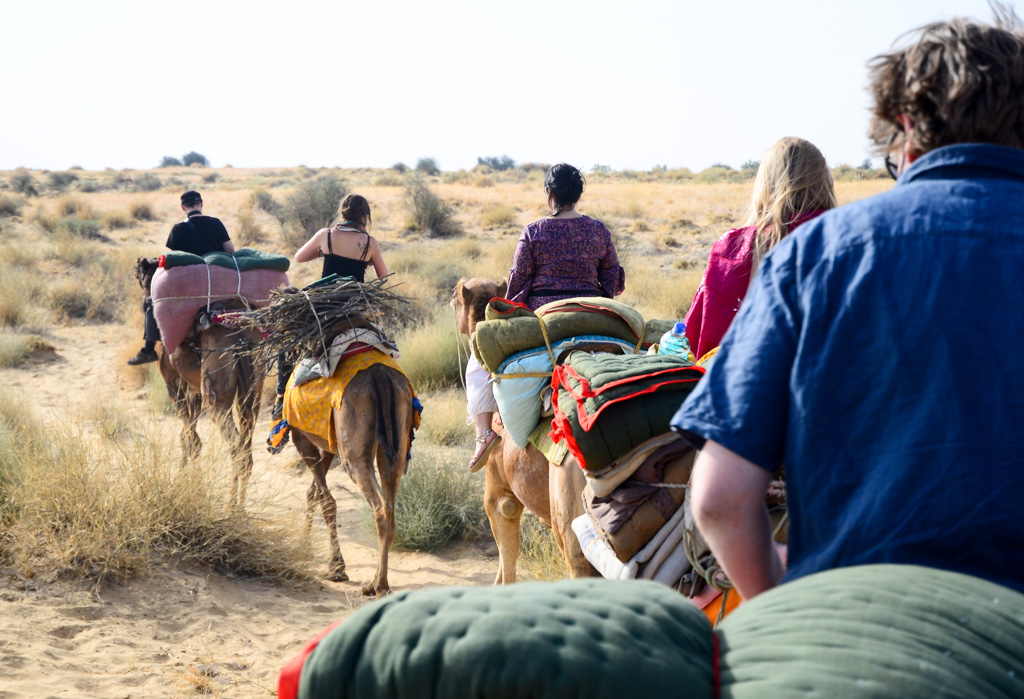
The view from the back of the pack of our 1-day camel safari through the Thar Desert.
We rode camels for about two hours, reached a series of sand dunes, and set up camp, which consisted of a pad and a couple of heavy blankets for each person staying overnight in the desert (which ended up being Kelly, myself, the two Dutch, and Tricia, the American from northern California).
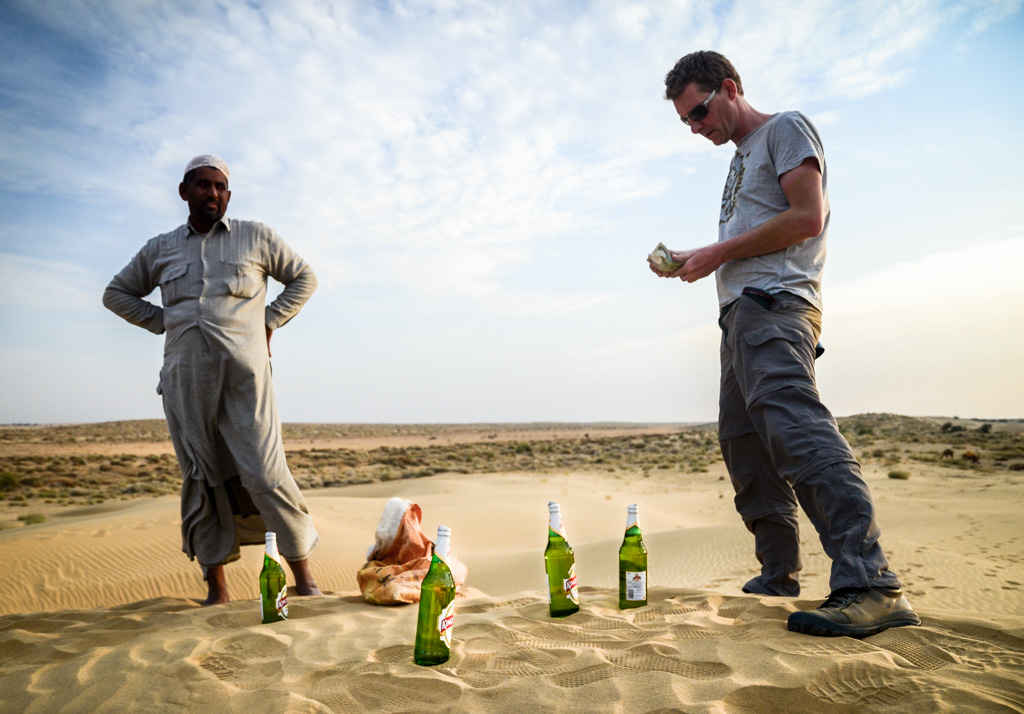
A roving camel-riding Muslim beer salesman found us on the dunes and sold us cold Kingfishers for 150 rupees a pop… a beer. More scripted than serendipity, but still felt like the latter.
Our two camel men cooked us dinner on a small fire – a vegetarian meal of daal, potatoes, chutney, raita and chapatis (baked fresh for us). Then we crowded around the campfire and told stories until the fire was low enough and the desert cold enough to warrant climbing under our blankets.
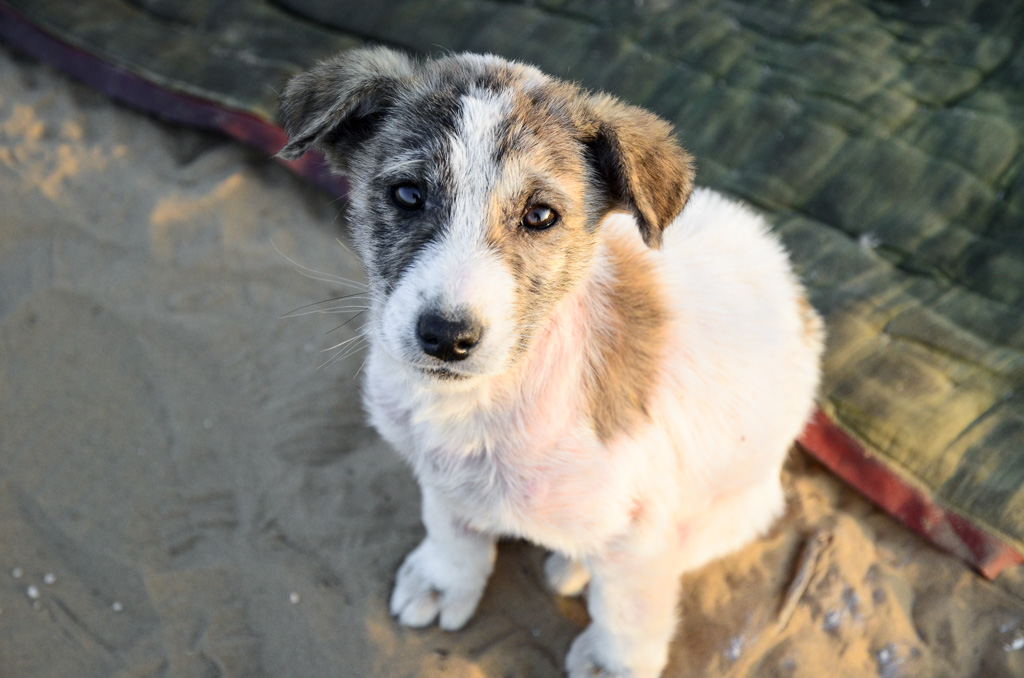
A whiny, mangy, desert puppy that would shriek if anyone came near it tried all night to sleep on our Dutch friends’ blankets. Semi-cute, but no thanks.
We packed up in the morning, had a small breakfast and got on the camels for the ride back to the pick-up spot. The camel safari was a welcome break from traffic, pollution and touts – I would do a 2-3 night safari next time if given the chance.
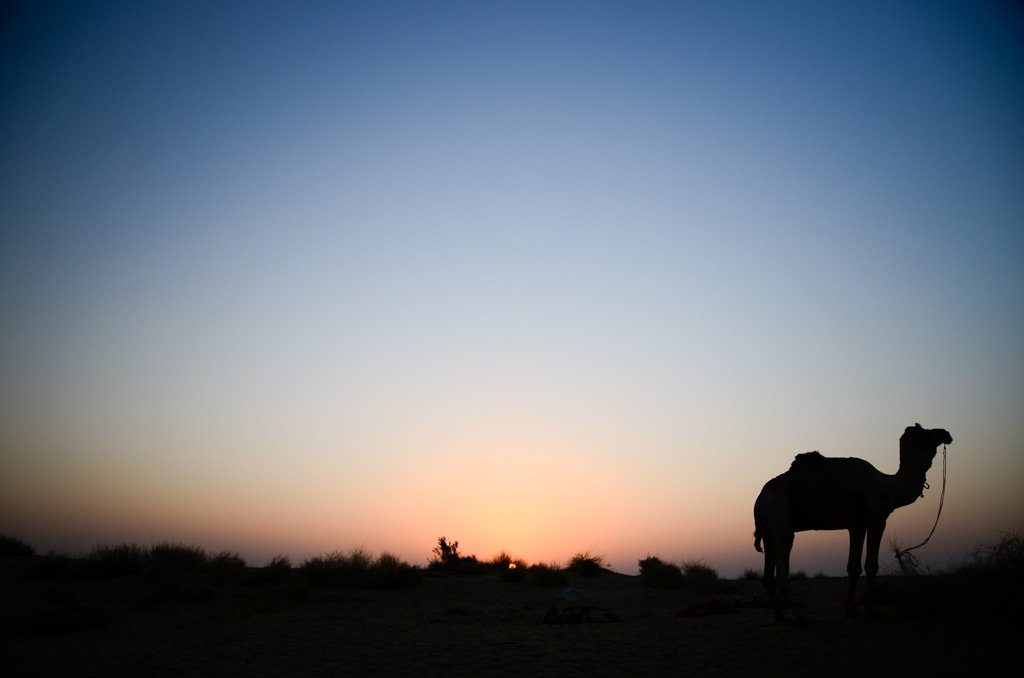
Thar Desert sunrise.
We spent the night in a hotel within the Jaisalmer fort walls (500 rupees a night) – the fort is a living one, with businesses and homes still inside. The streets are narrow and motorbike traffic is limited. Jaisalmer quickly became one of our favorite stops. The town is just small enough to get a grasp of, the architecture is nice, and we found the non-touristic market, where the vendors charge us fair prices! 100 grams of dates set me back a mere 10 rupees.
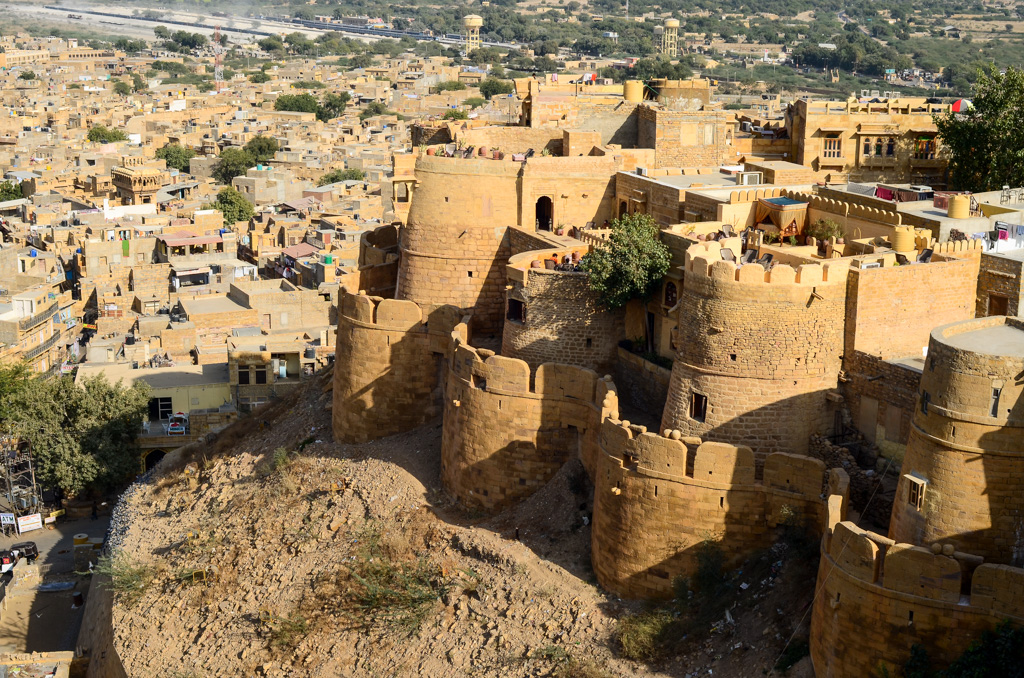
Jaisalmer Fort, viewed from Jaisalmer Fort.
We booked a sleeper bus for the night of Feb 3, from Jaisalmer to Pushkar. I foolishly booked the bus at the first travel agent we came across. He threatened that there were “only two seats left” on the bus. This is almost always a hard-sell, and I should have walked away from it to compare prices (I think we paid 100 rupees too much, at 400 rupees). Triple-bid everything!
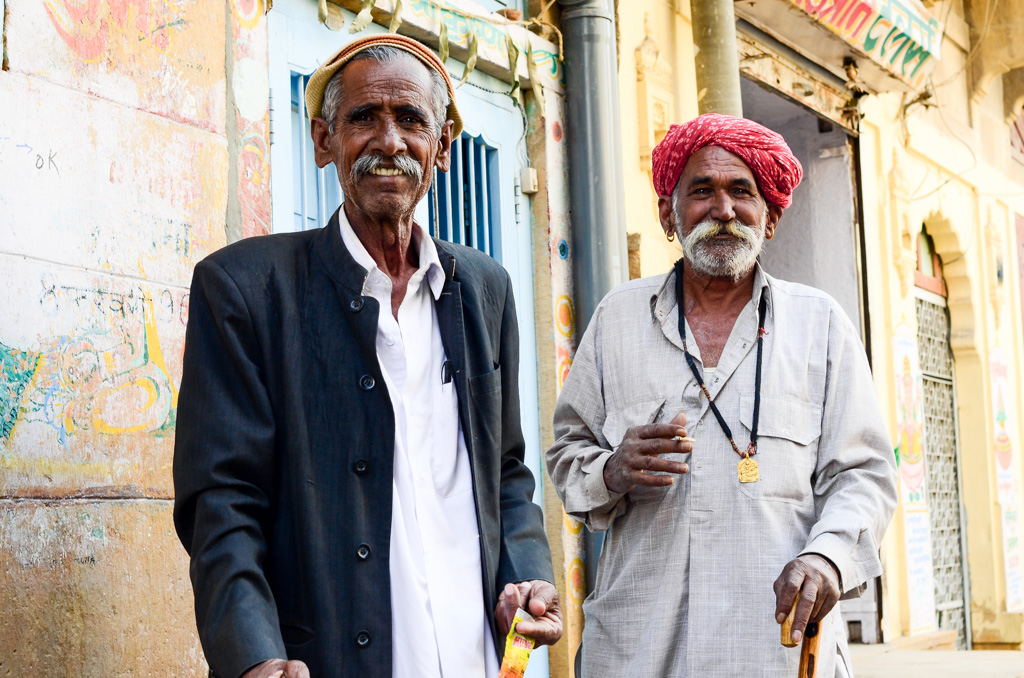
Jaisalmer. I liked these guys’ look and asked if I could get a picture of them. Of COURSE, they asked for money afterwards, like many do – 50 rupees apiece, they said. Ugh. In full disclosure, I paid them 50 rupees total (not each), which I still think is too much. I usually try to poach photos of locals so I don’t waste my time and money on situations like this.
Every time we’ve gotten a bus through a travel agent, we ask the question “Is this a nice bus?” which inevitably gets a “yes”, no matter how dirty and old the thing actually is. When we ask a hotel “is there hot water?” the answer is almost always yes as well, regardless of how many thimblesful of heated liquid are actually available when you shower. Individual water heaters in the bathroom have become a welcome sight.
The overnight bus was dirty and old. Dirtier than the pair of jeans I’d been wearing for the past ten days without a wash? Debatable. The latch for the window was broken, and the cold, cold night desert air came streaming into our sleeping berth unabated. The bumpy roads didn’t make sleeping any easier.
The stop for Pushkar came an hour early – 3:30 AM (as opposed to the scheduled 4:30 AM arrival). Awesome: five-plus hours of sitting in the dark at a bus depot (see: dusty vacant lot) with nothing to do. Why couldn’t this bus be two hours late like every other method of transport seems to be? Sitting around sleep-deprived in Pushkar sounded horrible, so we punted and asked the bus driver if we could keep our seats until Jaipur, four hours down the road. He said yes, and that we would need to pay extra. No problem – how much could it be? 200-250 rupees? The passengers below us started to make some, loud irritated noises and exchanged some sharp words (that we couldn’t understand) after they noticed we had stayed on the bus. The driver talked them down, and proceeded to charge us 450 rupees apiece for the additional fare to Jaipur. We started speculating on the cost – had our double sleeper berth been promised to the other passengers after Pushkar? Had the driver paid these passengers out of our inflated fare? We’ll never know. But throwing money at the problem solved it – we got to Jaipur around 7:30 AM, February 4th.
We stayed at a hotel near the bus station in Jaipur – Hotel Karni Niwas. It was the standard basic double room with private bathroom for 700 rupees. Had we known that the market and pink city of Jaipur were several kilometers away, we would have rethought this choice – we ended up spending a lot of time walking back and forth to the bazaar, harassed all the while by autorickshaw drivers.
There are plenty of historic sites in Jaipur that are worth a visit, but we had seen a number of forts and palaces already at this point and wanted to drift a bit and eat long meals. So we did.
We had breakfast at the Indian Coffee House on MI Road, a decades-old simple breakfast place where the coffee was both good and inexpensive, and where both locals and travelers frequent. Lonely Planet’s guidebook map noted the establishment in an incorrect location, so it took us over an hour to find it. But we did, and ended up taking our breakfast there two days in a row.
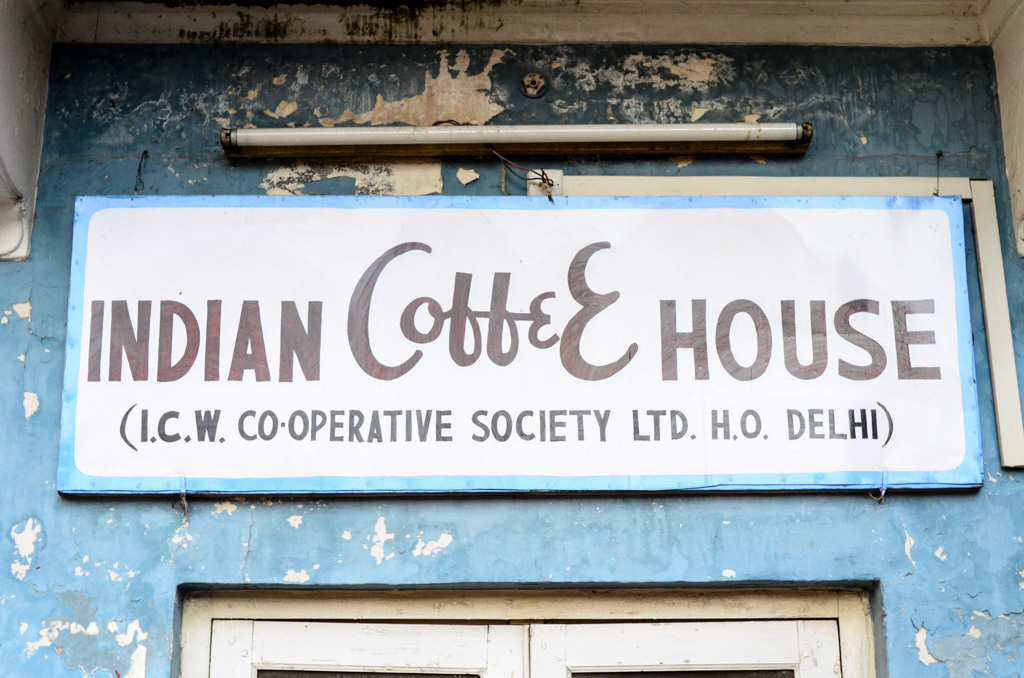
Jaipur.
Halfway through our meal, a local man in his sixties or seventies invited us to join him at his table. We obliged him and chatted for a while. He was a retired English teacher, now engaged in stamp and coin collecting (for which he had won various awards), and being a father/grandfather to his family, who all lived in the same building as him in the market area of Jaipur. He invited us for afternoon tea at his home. We battled our way through the bazaar and somehow found his building – he showed us his stamp collections, introduced us to his son and granddaughter, and requested that we send him coins and bills from our travels. His wife made us masala chai. How nice to have an interaction with a local that doesn’t involve a sales pitch at the end!
The previous night, we took in a Bollywood movie at the theatre – “Agneepath”, a “you killed my father” righteous-revenge flick complete with big song and dance numbers. Exhausted from our long bus ride the previous night and with no subtitles to follow, we fell asleep halfway through. The locals were pretty into it, though.
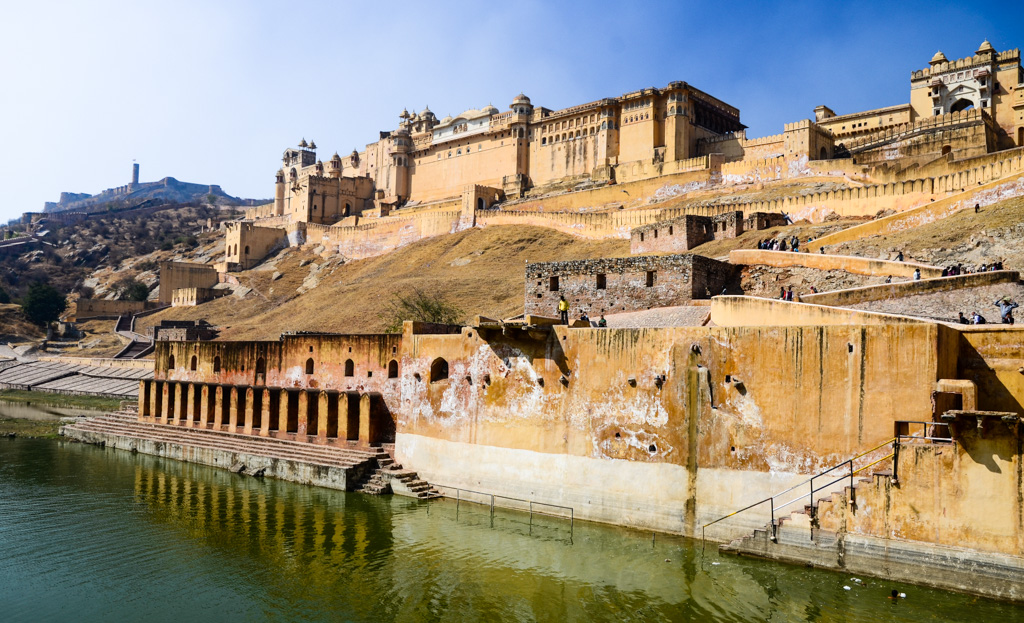
The Amber Fort. Jaipur.
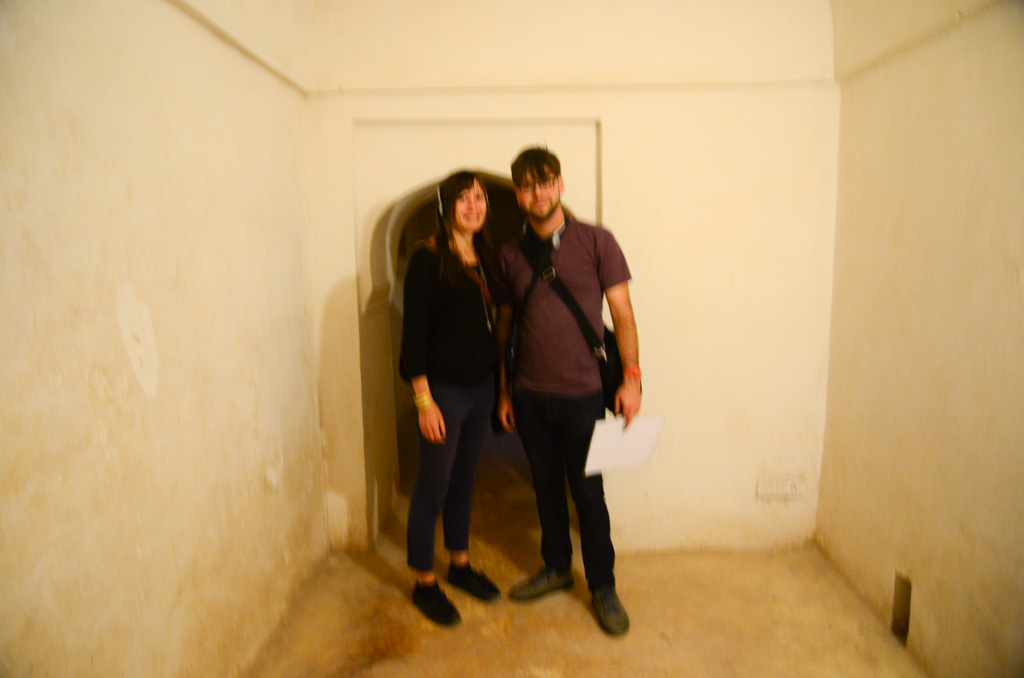
This is the kind of moving, telling photo that a security guard can insist upon and execute in an exciting, colorful location like a water collection room in a five-hundred-year-old fort. I have now wasted nearly as much of your time as he did ours. Amber Fort, Jaipur.
Amber Fort, just outside of Jaipur, was alright, but we were all forted-out by this point. Our autorickshaw driver insisted on taking us to some textile and carpet production factories on the ride back to town. These visits involved some impassioned, irritating, persistent sales pitches for why we should buy a carpet, despite our endless, unchanging broken-record chorus of “no thank you”.
We tried to leave. The carpet salesman (that kept referring to us as citizens of the “United Nations of America” insisted that we stay, sit and let him show us his wares. He was raising his voice, and it started feeling like he was threatening us. We got out of there as fast as we could, still carpet free.
Later that day, we were walking down a quiet Jaipur street, and a clothing maker near attacked me with a sales pitch, and kept repeating (again, in raised tones) that we come into his shop for “ONE MINUTE, ONE MINUTE, JUST ONE MINUTE”, despite our complete lack of interest. This kind of abrasive persistence is often followed by the salesman puppy-dog eyes when you turn them down. This “annoy the hell out of your potential customer, then attempt to make potential customer pity the salesman” thing is everywhere in Rajasthan, and it’s perplexing to think that any sale has ever been made via this routine. I think I’m going to start wearing highly visible headphones when I walk down the street.
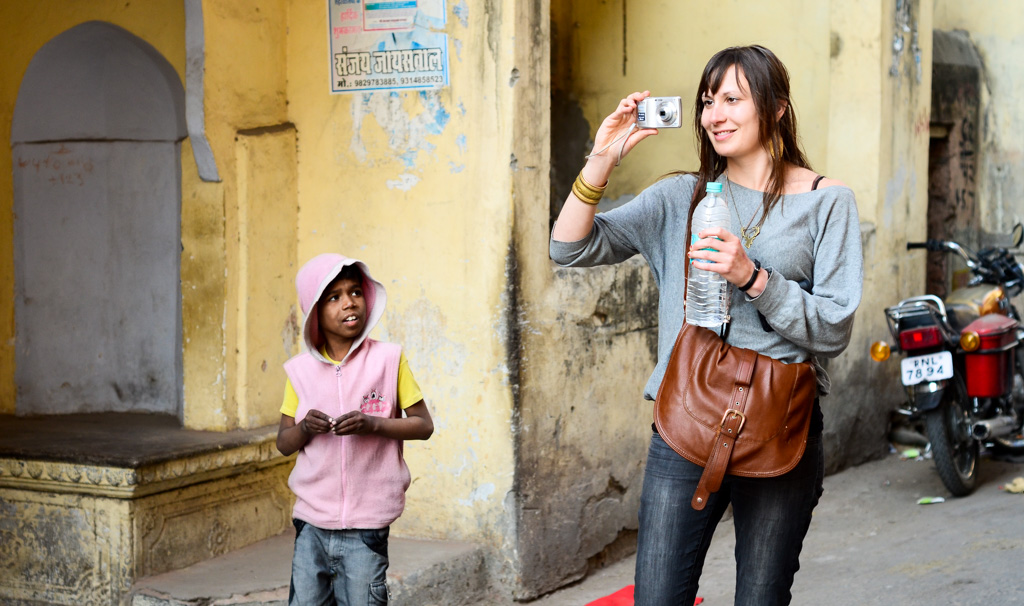
mutually assured distraction. Kelly in Jaipur.
We pre-booked a train for Agra via www.cleartrip.com (the first form of transport we booked ahead instead of just winging – wow!) so we could tick the “I have seen the Taj Mahal” box and loaded the backpacks again.
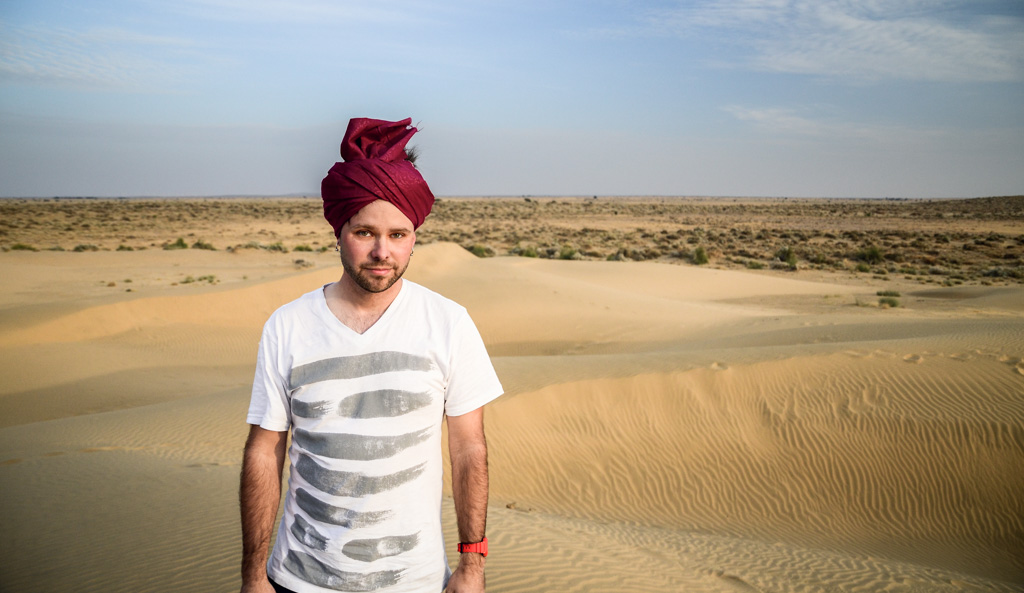
I had a turban for about a half hour.
NEXT STOP: Agra & the Taj Mahal








Thanks so much for this! I have not been to such as great post for a long time!